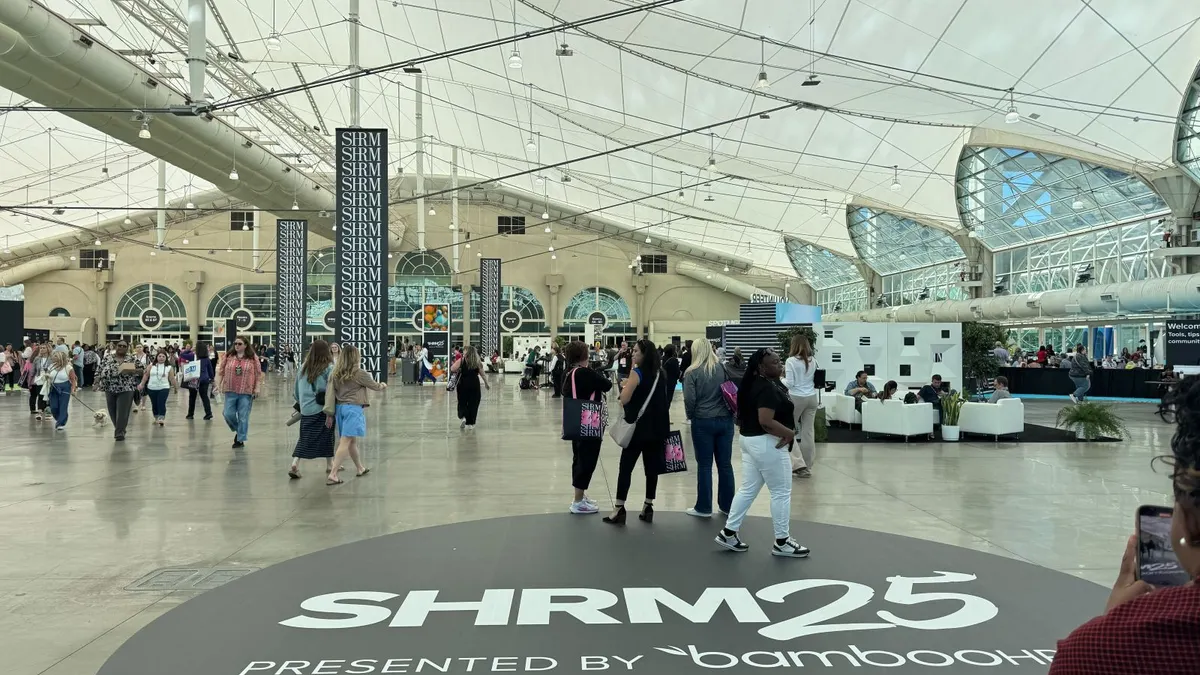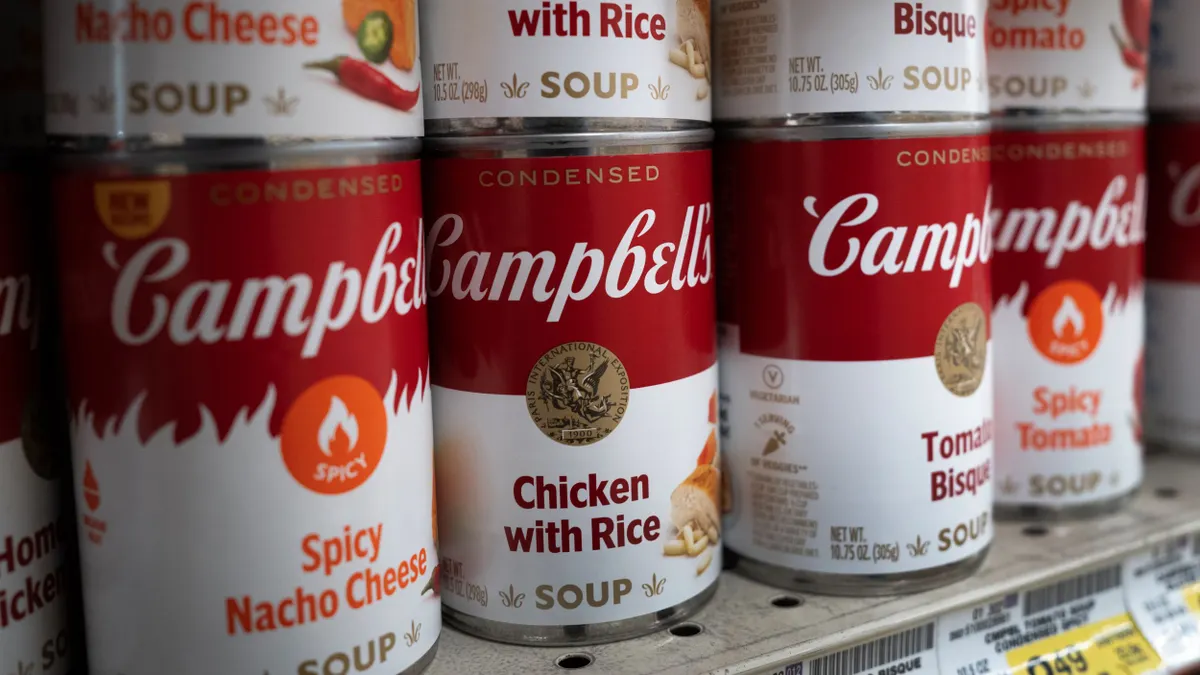At the Benefits Forum and Expo last week, many sessions were dedicated to communicating with, creating bridges with or offering benefits to millennial employees.
Clearly, employers are concerned — especially since millennials recently emerged as the most populous generation in the workplace, according to Pew Research Center. Experts in attendance offered some solutions and ideas to consider.
Employers should see the data before they act. Millennials may not be that different from other groups after all — but changes may become necessary to keep them happy in the long run.
How millennials perceive benefits
HR Dive spoke with Vlad Gyster, Founder and CEO of Airbo, and Janet McNichol, Human Resources Director of the American Speech-Language-Hearing Association, both of whom presented at BFE. They proposed the question: Do Millennials think differently about benefits?
They gathered data on the adoption of benefits by millennials in an attempt to answer it. They examined a range of office aspects, from benefits in the traditional manner (health insurance, 401k) to office flexibility and culture to figure out what, if anything, millennials value more or differently.
The top two things millennials care about: a solid salary and opportunities for promotion — just like Baby Boomers and Gen X.
In fact, when they examined who prefers which benefits over others across all age demographics, not much was revealed. "The researchers told us, basically we have nothing," McNichol said. "Demographics were not indicators of who would make what choice."
Millennials, it turns out, will choose what matters to them, just like every other employee. Even concerning technology use and social media in the workplace, age was only a slight factor.
Why employers continue to be concerned about millennial interests is partly due to hype. Benefits like nap pods and on-site catered lunches (all products of Silicon Valley's talent war) garner a lot of attention in the press, Gyster said, and in turn, many employers think they need these sorts of workplaces to recruit young people. But there's actually no data that millennials want or need those types of benefits more than anyone else, he added. Besides, many of the perks and promises that come out of Silicon Valley come from a very specific and extreme talent shortage that most industries are not experiencing right now.
But even though millennials don't necessarily want or need new kinds of benefits, some things in the workplace are changing, they noted.
The single life stage is lasting longer. Millennials are putting off marriage and children for unprecedented periods of time, meaning that companies may be subsidizing family healthcare plans at a higher rate than in the past.
In general, health care is more expensive. High deductible health plans (HDHPs) may not be the best for these young, healthy employees after all. Gyster and McNichol disagreed on whether HDHPs would actually hurt millennials in the long-run, though both agreed that millennials were in desperate need of healthcare education. In one study they found, half couldn't define "deductible" and three-quarters couldn’t explain "coinsurance."
Millennials truly see wellness as a benefit. While many wellness platforms often approach wellness as something that must be foisted upon employees, millennials take to it with gusto, the pair noted. Sports and fitness apps are the most downloaded apps for adults aged 25-34, especially when compared to other generations.
Workplace flexibility continues to be important. For millennials, flexibility is the most important perk among non-cash benefits. Interestingly, Gen X considers work flexibility even more important than millennials. If no flexible arrangements were offered, 38% of Gen X would walk away from their current job, compared to 33% of Gen Y, according to their data.
Learning and development is huge to millennials. Just between 2013 and 2014, the corporate learning industry experienced 21% growth, and companies have more options than ever. Millennials are partly to blame, they said.
Culture: A different chemical make-up.
At BFE, Sean Kelly, CEO of SnackNation.com and founder of AwesomeOffice.org led an interesting session called "Engaging Millennials in the Workplace."
Since 2008, millennials' presence in the workforce has grown exponentially fast — but current workplaces largely still cater to the way of work established by Baby Boomers when they entered the workforce, Kelly said. Right now, workplaces are focused on harnessing dopamine, a brain chemical that produces a feeling of accomplishment and power. But such feelings don't last, Kelly said, creating cutthroat workplaces focused only on obtaining the next objective, the next success. This behavior creates burn-out and reduces retention.
Instead, workplaces should harness serotonin and oxytocin, brain chemicals that create longer-lasting feelings such as loyalty, trust, pride, status and leadership, he said. You either want your best employees to "go pro (leave the company for bigger things but leave a loyal member of the brand) or join the coaching staff," Kelly said. Millennials, members of a "we-focused" generation, thrive in these atmospheres.
Kelly offered some focus points for employers who want to improve their cultures.
- Create a strong sense of community. Publically recognize those who do well or follow the company's core values. Kelly's company does "crush it calls," where they all get together and talk about who did great things that week.
- Make your mission clear to your employees and proceed to actually live by it. Only in these environments do employees want to sacrifice their time and energy to do great things.
- Allow trust and enjoyment to thrive at the workplace. Encourage your workforce to make friends with one another and create an environment where failure is allowed and seen as part of the process.
- Encourage work-life integration rather than work-life balance. There's a reason offices have started looking warmer and more open than the cubicle farms of old. Saying one thing is good (life outside work) while the other is bad (work) doesn't lead to workers who want to work hard for your company, Kelly said.
The most important thing: Employers have a real opportunity here to make strong changes for their companies — but over two-thirds have no plan to cope with the ongoing generation shift in the workforce, Kelly said.
Millennials expect most of the same things as their older counterparts, but millennials expect them — be it flexibility programs or company tech — to be better. Workplace tools, in particular, are already improving partly due to millennials expecting flawless user interfaces, McNichol said. They've grown up with such technology.
Savvy employers are already making changes to confront the modern work world. A huge generational transition has already begun. It's best to get onboard now.





















